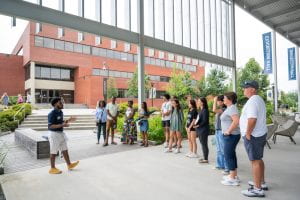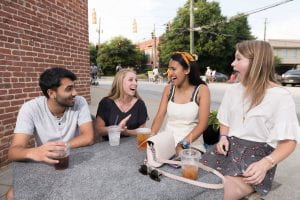This week we welcome Associate Director for Guest Experience, Andrew Cohen, to the blog. Welcome, Andrew!
Since there is no majoring in “admission” in college, I often get asked how I ended up in a career working in college admission — more specifically, managing campus visits and events. Like many of my colleagues in this profession, I started out as a college tour guide. (A story for another time is how I was not selected as a tour guide the first time I applied.)
During my time as an undergraduate student, I had the opportunity to welcome thousands of students and families to my alma mater and share a glimpse of what life was like for me as a student. As we head into the spring visit season, I thought I would brush off the cobwebs, reflecting on my tour guide years, as well as my current experience managing Georgia Tech’s guest experience, to provide some helpful tips to make the most of your campus tours this spring.
Your tour guide is just one person representing the whole institution.
Thinking back to my campus tours, I think about the poor pre-med or science students in my group as I raved about all my experiences as a communications major (hopefully they realized we had great science programs too!). I hear this feedback often from tour participants – “My tour guide was a biomedical engineering major, but I want to study computer science.”
 Campus tour guides are only one person and they share generally about most programs on their campus. Your tour guide is going to share information about the overall student experience on their campus, and many times their experiences are going to be similar to other majors.
Campus tour guides are only one person and they share generally about most programs on their campus. Your tour guide is going to share information about the overall student experience on their campus, and many times their experiences are going to be similar to other majors.
Personally, I chose my alma mater because I toured the school of communications and was in awe of their television studios, camera equipment, and production facilities, which showed me the hands-on experiences that were offered. I enrolled as an advertising/public relations major and never stepped foot in one of the studios or held a camera during my time as an undergrad. What the tour showed me was that there was an emphasis on hands-on experiences, which ended up being very true to my major, but just looked different.
Remember that your tour guide is just one student representing the whole institution. Think about the stories they share broadly and what that means about the student experience and the programs offered at the institution. Use your time with your tour guide to get a good feel for the general student experience and the institution’s community. When you are looking for specifics about a particular program, seek that information from major-specific programs, visits, or tours that are offered.
Utilize the time between tour stops.
Within the profession of campus tours, there is a big debate about tour guides walking backward. Personally, I am not a fan… been there, done that! I think back to icy walkways in Upstate New York, crossing campus streets and parking lots, and the many puddles that ruined several pairs of shoes. It is now more common to see tour guides walking alongside tour participants between each tour stop.
This time can be some of the most informative times of your campus tour. Join your tour guide up in the front and start up a conversation. Get to know them and ask them some more questions about their experience… even if you are on the quieter side, don’t be intimidated! Tour guides love to talk about themselves and will carry the conversation! This is a chance to hear more about their life as a student. This authentic conversation is a great way to make the most of your tour experience.
Pro-Tip: If you are not talking to the tour guide, make sure you are still looking around during this time. This is a great time to look through windows into classrooms and labs, take note of program flyers on the walls, or maybe even listen in to hear what students are talking about with each other.
Post-Tour Recommendations

As your tour guide is wrapping up and sharing with the group why they chose the institution, think about what is next for you. A campus tour is never going to show a full campus or college town/city. As you near the end of your tour, this is a great opportunity to get recommendations from your tour guides (or even admission staff) on what else there is to see or do. This is your chance to find out what places were not shown on tour but might be worth checking out on your own (again, just looking through windows, reading posters on walls, or listening in on conversations can give you a very different perspective).
For me, I went to school in Upstate New York and had about a 45-minute drive on a two-lane country road after getting off the highway, which was an interesting experience during my first visit when my family arrived late the night before my tour. This place ended up being my home for the next 4 years; I needed to make sure I liked the college town and community. Make sure you plan some time to explore off-campus and eat at a local restaurant. As a tour guide, I had my top favorite restaurants that I could easily rattle off!
Make sure to get these types of recommendations from current students to gain a better feel for what your experience might be like. Your tour guide will have some recommendations and happily share some must-dos while there.
Whether you are a high school sophomore or junior just starting your college search or a senior working on narrowing down your decision, I hope you enjoy your time on campus tours this spring. Take advantage of every minute you have during your campus visit and talk to as many people as you can. And don’t forget to say hi to my fellow campus visits colleagues out there! It’s a busy time of year for all of us!
 Andrew Cohen joined Georgia Tech in 2018 and currently oversees the guest experience for all Undergraduate Admission visitors. His love for providing visitors with informative, authentic, and personal experiences started as a student tour guide at his alma mater, Ithaca College. Andrew’s passion for the visit experience has led him to his involvement in the Collegiate Information and Visitor Services Association, where he currently services as the President-Elect on their executive board.
Andrew Cohen joined Georgia Tech in 2018 and currently oversees the guest experience for all Undergraduate Admission visitors. His love for providing visitors with informative, authentic, and personal experiences started as a student tour guide at his alma mater, Ithaca College. Andrew’s passion for the visit experience has led him to his involvement in the Collegiate Information and Visitor Services Association, where he currently services as the President-Elect on their executive board.
